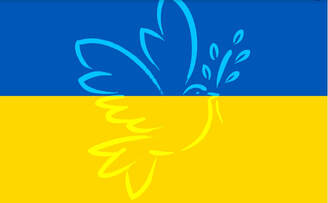 February 24th marks a grim milestone – the anniversary of Russia’s invasion of Ukraine. The initial shock of the early days and weeks of the war – the dread instilled by footage of a 40-mile column of tanks heading for Kyiv from the Belorussian border; the shelling of apartment blocks; the flood of refugees trying to reach Poland – has subsided into an uncomfortable acceptance. Today the worst of the fighting is back in the east of Ukraine, as it had been before, further from the West, further from our consciousness. Already over 14,000 people had died – many of them civilians – in eastern Ukraine between 2014 and 2022 in a conflict that was no longer being reported, and which many outside the country had forgotten. For now, in Kyiv and elsewhere, normal life has resumed to a degree. The exodus of Ukrainian women and children has slowed to a trickle; some families have become accustomed to living apart, while others have returned to their homes if not for good, then at least to visit loved ones. Residents have learned to live with power rationing and air raid sirens. For those of us living in Europe, it feels like the worst of the crisis has passed. The winter of exorbitant fuel prices is almost over, we can afford to fill our cars once again. But the horrors of this war live on for so many and must never be forgotten by the rest of us. The atrocities of Bucha; the mass graves of Izyum; the flattening of Mariupol and Bakhmut; the repeated bombardment of energy and water infrastructure in a freezing cold winter. The death toll is staggering, with an estimated 100,000 Ukrainian soldiers killed or wounded and Russian casualties higher still. Estimates of civilian deaths range from 8,000 to 30,000. Barely a single Ukrainian family remains unaffected by loss of some kind. The threat of nuclear war has hung over the conflict from the beginning and continues to hold back Western support. From the very start, Ukraine’s president Volodymyr Zelensky pleaded with the West to “close the sky”. Yet again this month in London, Paris and Brussels he repeated his demands for fighter jets that Western leaders are unwilling to heed lest they provoke a nuclear response from Russia. The Ukrainian army has fought with a passion and determination that few could have imagined, repelling many of the initial Russian advances and winning back swathes of territory in the autumn. The Ukrainian people have shown an astonishing resilience and won the admiration of us all. An unpopular and ineffective comedian-turned-president has transformed into a Churchillian figure, rallied the Western world and become an unlikely hero. And still Ukraine waits in trepidation for the much-discussed spring offensive, in whatever form it may take. Russia has been training and arming some of the 300,000 reservists it recruited back in September ready for a new attack. There is talk of weapons deliveries from China. An end to the war appears as remote as ever. And what of Russia? It has become a pariah state barred from selling its oil and gas – its key source of revenue – in much of the world, with its financial system and most of its industry subject to Western sanctions. Foreign companies have shut down their Russian operations, or sold their stakes in Russian firms; oligarchs have had their luxury yachts impounded, their freedom to travel terminated. Even President Vladimir Putin’s friends in China and India have been unwilling to offer much support – although their reluctance has not stretched as far as refusing the opportunity to buy cut-price Russian oil. But support for the war in much of Russia remains unstinting thanks a barrage of anti-Ukrainian and anti-Western propaganda in the state media and a blank denial of the facts. All dissent is brutally repressed; many of the brave protestors who staged demonstrations in the early days of the war have emigrated or been imprisoned. Thousands of Russians – mostly professionals – have left the country in protest at the war and thousands more to avoid mobilisation. All political opposition to Putin has been silenced, with opponents in jail, in exile, or murdered. A spate of Russian businessmen falling to their deaths from windows or balconies has been one of the more bizarre features of the last year. Nevertheless, occasional cracks have started to appear in the armour of state-media backing for the so-called special military operation. And some Russian citizens who had previously supported the war are beginning to question Putin’s judgement as their menfolk return in body bags – the number of Russian soldiers killed per day in Ukraine is thought to have reached 824 in the first two weeks of this month, the highest so far. On top of this, the impact on the population of economic sanctions has so far been limited, but is expected to increase over time. The best hope for an end to the conflict may lie with the Russian people, if their patience with the war and the president who wages it begins to run thin.
0 Comments
Leave a Reply. |
Keeping stories aliveThis blog aims to discuss historical events relating to the Jewish communities of Ukraine, and of Eastern Europe more widely. As a storyteller, I hope to keep alive stories of the past and remember those who told or experienced them. Like so many others, I am deeply troubled by the war in Ukraine and for the foreseeable future, most articles published here will focus on the war, with an emphasis on parallels with other tumultuous periods in Ukraine's tragic history. Archives
March 2024
Categories
All
|
 RSS Feed
RSS Feed
